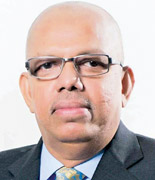|
Micro CEO laments:
Locally assembled vehicle market stagnating
The Rajapaksa regime did not have an influence on the sale of locally
assembled vehicles, which has been low right throughout due to high
vehicle imports, Micro Holdings (Pvt) Ltd. Chairman and CEO Dr. Lawrence
Perera told a gathering at the company’s 20th anniversary celebrations
in Polgahawela, last week.
|

Dr. Lawrence Perera |
Scoffing at accusations that he had close links with the former
regime and benefited from it, Dr. Perera said that vehicle sales dropped
from around 14 percent to around nine percent during the former regime
and added that sales had not improved even during the tenure of this
Government.
“You cannot say that my affiliation with the Rajapaksa regime helped
boost sales when the numbers have been low. Inconsistency of policies
and lack of a stable government are a major hindrance to increase
sales”, Dr. Perera said.
He said as imported vehicles hold 95 percent of the market the local
industry cannot survive.
However, Micro cars have carved a niche in the minds of customers
with value addition and safety measures.
Regarding exports, he said currently the company exports vehicles to
Bangladesh, Nepal and Malaysia.
“We are keen on exporting to other countries as well but when a buyer
looks at our market share in the country they get discouraged. I would
like to export to South Africa but as the current market share is low
they will not want our vehicles,” Dr. Perera said.
“I had discussions with President Maithripala Sirisena and Prime
Minister Ranil Wickremesinghe regarding the automobile industry and
promoting local industries.
When the Prime Minister asked me to increase exports I said how can
we do that when the country imports a large number of vehicles
undermining a local company that has been in existence for 20 years
contributing to employment generation and the economy,” Dr. Perera said.
Bureaucrats of this and the former government did not understand the
value of a local company and did not convey to policy makers the
importance of recognising and promoting a fully home-grown entity. The
then government did not support Upali Wijewardene who set up the first
vehicle manufacturing plant in Sri Lanka.
“We have a lot to learn from South Korea which has excelled in the
automobile, electronics and mobile phone industries,” Dr. Perera said.
He said that value addition to vehicles produced at Micro Holdings
was around 35 percent and the company has maintained standards as a
reliable automobile entity for the past two decades.
“Although some critics say that there isn’t a value-addition of 30
percent it is not true. You must see for yourself and believe. Seeing is
believing. SsangYong Motor Company, Korea’s first SUV manufacturer has
recognised us as the official assembler of SsangYong in Sri Lanka which
amply testifies to the standard of the company,” he said.
Dr. Perera said that the company not only takes pride as a local
company but also as one which employs around 850 workers empowering
youth with training in modern technology in the automobile and
engineering fields.
Ambassador to South Korea Won-sam Chang said that the automobile
industry in Korea helped develop the economy of the country contributing
around 10 percent to exports and 70 percent of the employment
opportunities in the country.
“Sri Lanka can learn from South Korea in developing economic
strategies by investing more on cutting-edge technology and thereby
become a successful country. Sri Lanka can do what South Korea did
through to its hard-working and skilled workforce,” Chang said. - LF |

